PuraBond
Absorbable Haemostat
PuraBond is a synthetic haemostatic material in the form of a prefilled syringe.
PuraBond is indicated for haemostasis in the following situations encountered during surgery or endoscopic procedure, when haemostasis by ligation or standard means is insufficient or impractical1:
- Bleeding from small blood vessels and oozing from capillaries of the parenchyma and surrounding tissues of solid organs
- Oozing from vascular anastomoses to native or artificial vessels, on the surface of blood vessels and surrounding tissues
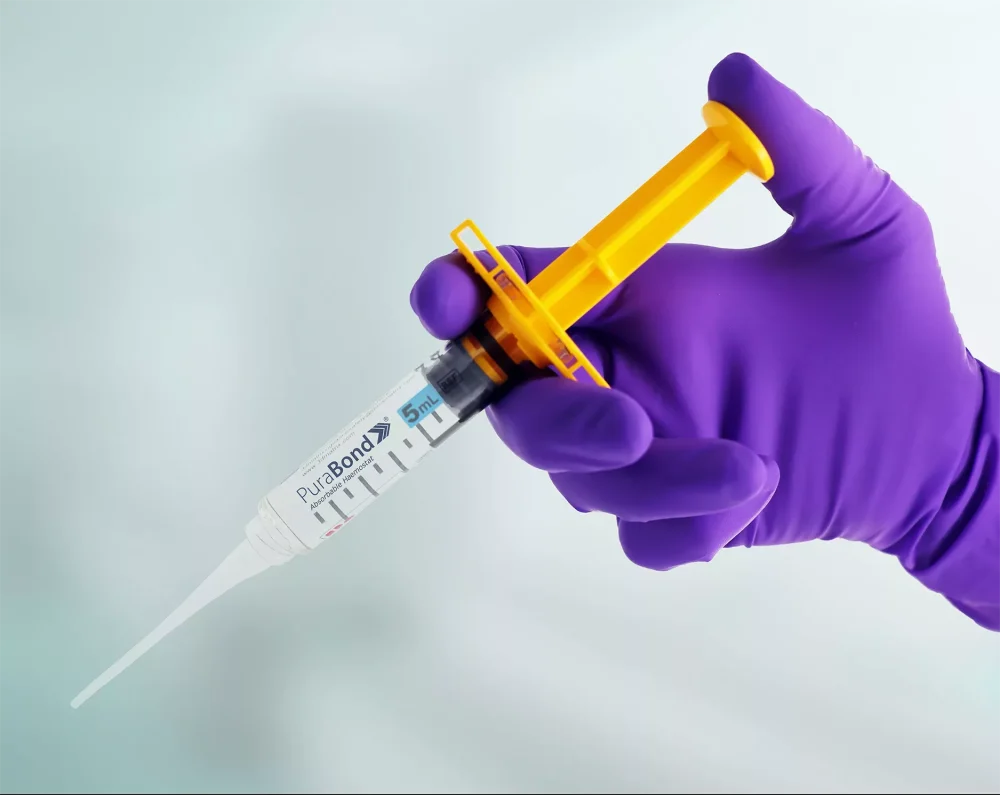
-
No Waiting Time
-
Does Not Swell
-
Transparent
-
Mimic Human ECM
-
Revolutionary Bleeding Control
-
Synthetic
-
Reapplicable and Resorbable
-
Suitability
-
Flexible
PuraBond = No Preparation
Surgeons may have to wait for haemostats to be assembled or prepared during a procedure, whilst having to manage the bleeding area. This can be time critical and costly as the procedure is prolonged.
PuraBond is delivered in a prefilled syringe, just connect the applicator using the luer-lock and the product is ready to use. It does not require any preparation before or during surgery, allowing surgeons to quickly manage bleeding and continue with the procedure.
PuraBond* has been demonstrated to achieve complete haemostasis in less than 15 seconds.1
*PuraBond is part of the RADA16 family of products.
1. Morshuis M, Final Clinical Study Report: A Single-Centre, Single Arm Post-Market Clinical Follow-Up to Confirm the Safety and Performance of PuraStat Absorbable Haemostatic Material for the Management of Bleeding After Left Ventricular Assist Device (LVAD) Implantation
PuraBond does not swell1
In internal testing PuraBond does not swell after implantation or during the resorption process. This is because unlike other hydrogels which are designed to absorb water as part of their breakdown cycle, PuraBond is broken down by enzymatic action.
As PuraBond doesn’t swell it will not cause compression of underlying tissues of structures, or prevent that natural physiologic dilatation of vessels.
1. Data on file (Swell Report 2018, Eun Seok Gil 12/06/2018)
PuraBond IFU-009 Rev 2 / IFU-014 Rev 2
PuraBond is Transparent
This image demonstrates the transparency of PuraBond. Once applied, clear visualisation of the underlying tissue is maintained, allowing surgeons to easily observe the bleeding point and continue with the procedure once haemostasis has been achieved.

PuraStat mimics extra cellular matrix
The peptides in PuraStat are synthetized in a specific sequence which provide the molecule with shape memory to enable them to self assemble into a scaffold which mimics human extra cellular matrix (ECM).
Based on results of scanning electron microscopy, the structure of PuraStat self-assembling peptide hydrogel is understood to be a network of fibres with a diameter of around 10–20 nm and pores with a diameter of about 50–200 nm that resembles the mesh structure of natural collagen.

a Mammalian ECM1
X15,000
1Mm

b PuraBond Scaffold1
X15,000
1Mm
1. Dhwani J. , Rajesh V. A Review on Extracellular Matrix Mimicking Strategies for an Artificial Stem Cell Niche. Polymer Reviews. 2015, 55:4, 561-595, DOI:10.1080/15583724.2015.1040552
Revolutionary Bleeding Control
The trigger for the peptides in PuraBond to begin self assembly is a change in ionic charge. PuraBond is acidic so when in contact with more alkaline liquids the reduction in ionic charge causes the rapid self assembly of β-sheets. The β-sheets then transition to form a complex network of fibres with a diameter of around 10–20 nm and pores with a diameter of about 50–200nm that resembles the mesh structure of natural collagen1. The formation of this complex fibre network rapidly seals the bleeding point leading to haemostasis.
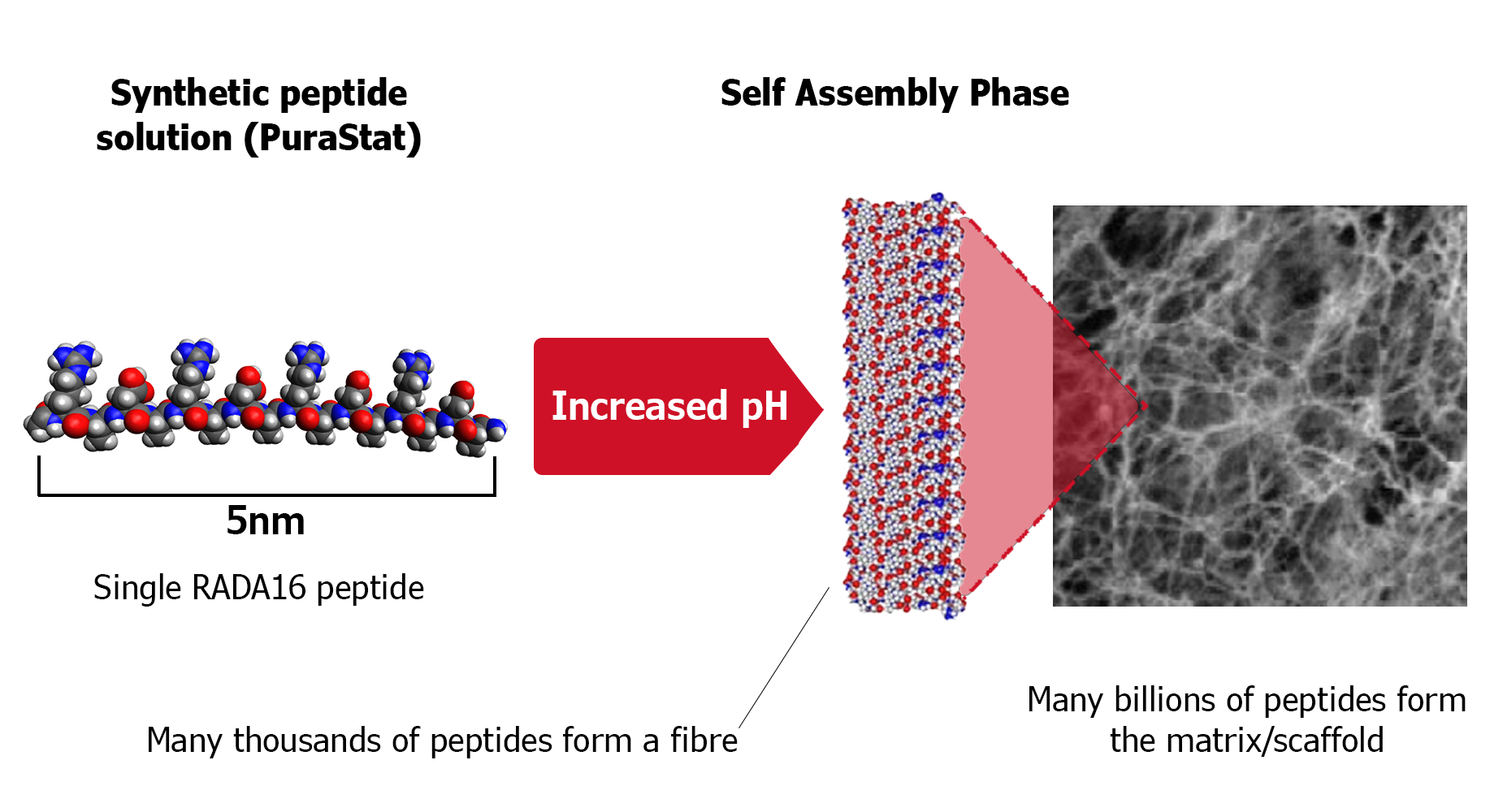
1. Masuhara H. et al. Novel Infectious Agent-Free Hemostatic Material (TDM-621) in Cardiovascular Surgery Ann Thorac Cardiovasc Surg. 2012;18(5):444-51
PuraBond is 100% Synthetic
The peptides are made from chemically synthesized amino acids to guarantee the final product is contamination free. The amino acids are bonded together in a specific sequence at a 2.5% concentration in aqueous solution to make PuraBond. 1
This means that PuraBond is well accepted by the body.

1. PuraBond IFU-009 Rev 2 / IFU-014 Rev 2
PuraBond is Resorbed in 30 Days1
As PuraBond is made up amino acids, it is fully absorbed by the body and does not need to be removed. It is broken down by the actions of enzymes which break down the peptide scaffold into the constituent amino acids over approximately 30 days.1 The amino acids are metabolised by the body or excreted if they are surplus to requirements.
Should PuraBond need to be reapplied, the existing hydrogel can either be easily washed away if you choose, or another layer can be simply applied on top of the existing layer.
1. PuraBond IFU-009 Rev-2 / IFU-014 Rev 2
PuraBond is Suturable & Clipable
As PuraBond is a liquid hydrogel, it is largely composed of water and remains completely flexible once applied, making it suitable for a variety of situations.
PuraBond does not harden or cure, it remains soft, meaning it can be easily be sutured through should the need arise.
This also means that you can place surgical or endoscopic clips directly through a layer of PuraBond, this is very helpful if using PuraBond to clearly identify bleeding points when bleeding is more profuse or persistent.
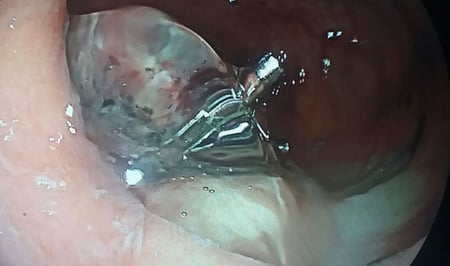
PuraBond Will Not Migrate1
PuraBond is naturally viscous, this means it is flexible enough to flow easily into small and uneven spaces. When in contact with blood the change in pH causes the self assembly of PuraBond to occur rapidly at the interface between it and the bleeding point, gaining further integral strength as the reaction occurs. Any PuraBond not incorporated in the final clot will separate and may be left in situ.
The flexibility of this hydrogel also ensures that it does not clog in the syringe, allowing it to be easily used multiple times throughout a procedure and reducing the need to prepare a new haemostat, providing surgeons with extra relief during time critical procedures.
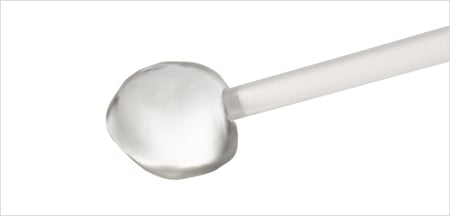
- PuraBond Biologic Safety Report – Current Version
PuraBond Technology
The matrix is formed from synthetic peptides which are composed of three naturally occurring amino acids in a sequence which is repeated 4 times. The peptides self-assemble to form a 3-dimensional matrix upon a change in pH2 caused by exposure to an ionic solution such as blood, peritoneal fluid or other bodily secretions.

Applying PuraBond is simple
PuraBond is a haemostat existing of a nanofiber network structure that requires no preparation. This means it is ready to apply straight from packet to patient.
To apply PuraBond is just as easy, simply deploy PuraBond at the base of the lesion and wait, following the instructions below:
- Remove as much blood as possible from haemorrhagic site.
- Apply an adequate quantity of PuraBond to the haemorrhagic site.
- The nozzle should be as close as possible to the bleeding point.
- Do not disturb the self-assembled PuraBond gel until sufficient time has been allowed for haemostasis to occur.
- If necessary, repeat the application of PuraBond several times until haemostasis is achieved.
- After haemostasis is confirmed, excess PuraBond may be left in place.
A global network of distributors
We have a global network of partners and distributors who work closely with us to ensure you safely get our products and full, high quality support wherever you are and whenever you need it. They all believe in our products as much as we do, and can’t wait to show you how they can help you

Keep up to date with PuraBond

.png?width=73&height=73&name=calendar%20(1).png)
Reference
1. PuraBond IFU-009 Rev 2 , PuraStat IFU-014 Rev 2, PuraStat IFU-020 Rev 1
Products from 3-D Matrix
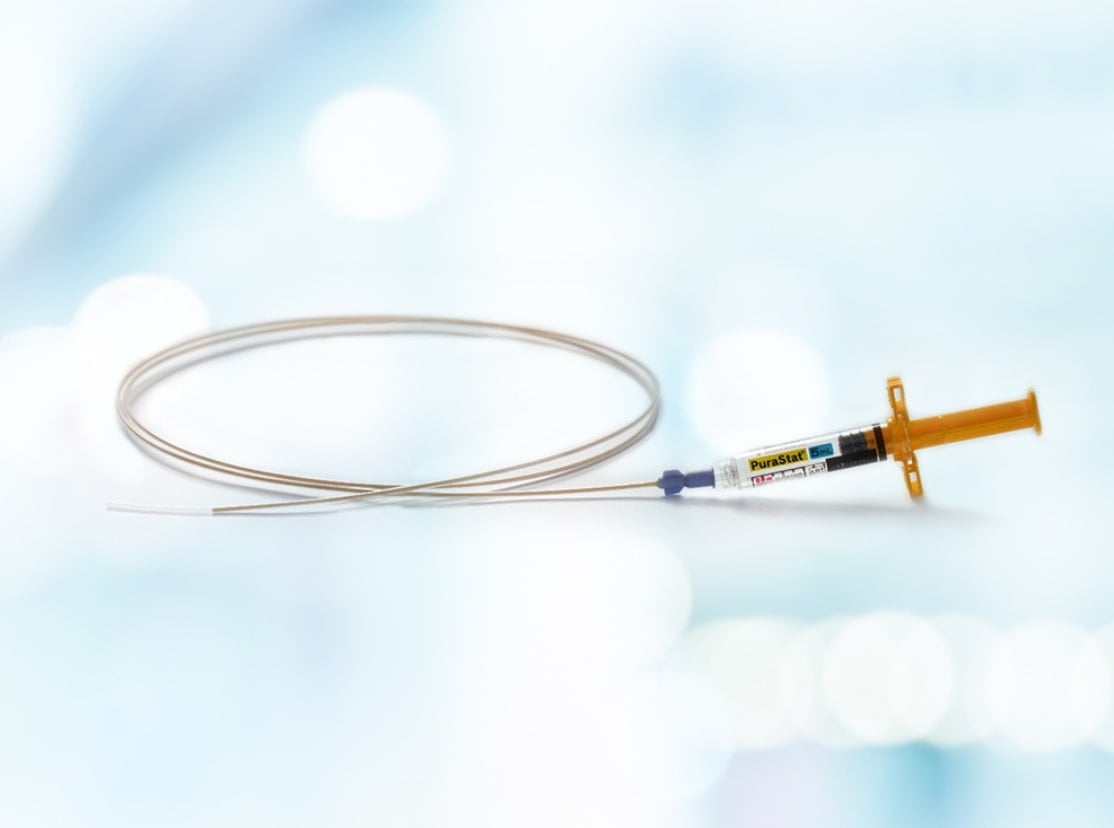
Accessories
Our accessories are specifically developed with users in mind for both endoscopic and laparoscopic procedures, giving you the full set of accessories that you need for your procedures.
Simply connect the PuraStat syringe with the accessory via the leur lock connector** and it is ready to use.
If you are interested in our accessories or would like more information, please contact us.
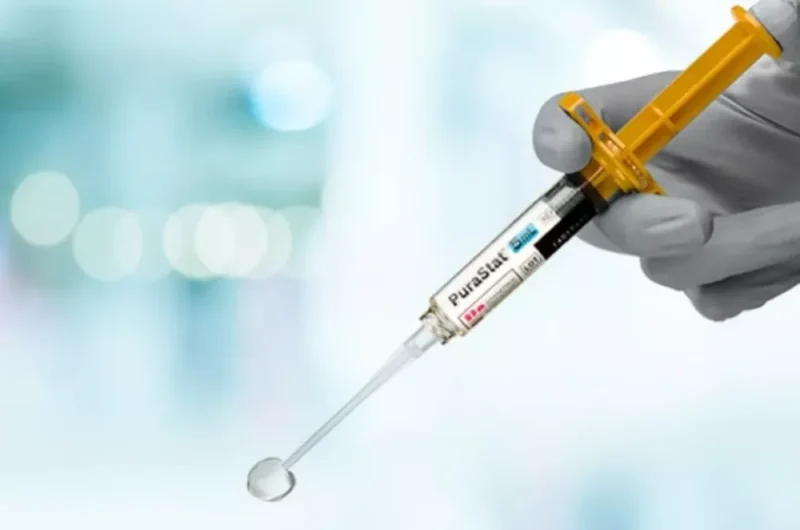
PuraStat
PuraStat is a synthetic haemostatic material in the form of a prefilled syringe. PuraStat is indicated for haemostasis in the following situations encountered during surgery, when haemostasis by ligation or standard means is insufficient or impractica1:
Learn More »
PuraBond
PuraBond is a synthetic haemostatic material in the form of a prefilled syringe, filled with a clear, aqueous peptide solution. PuraBond is part of the RADA16 family of products, alongside PuraStat. Contact between the product and liquids such as blood leads to the formation of fibres in the aqueous solution, yielding a peptide hydrogel. The hydrogel quickly coats the point of bleeding and, by physically closing the superficial part of the broken blood vessel, causes blood coagulation in the deeper part of the vascular wall, resulting in haemostasis.
Current Page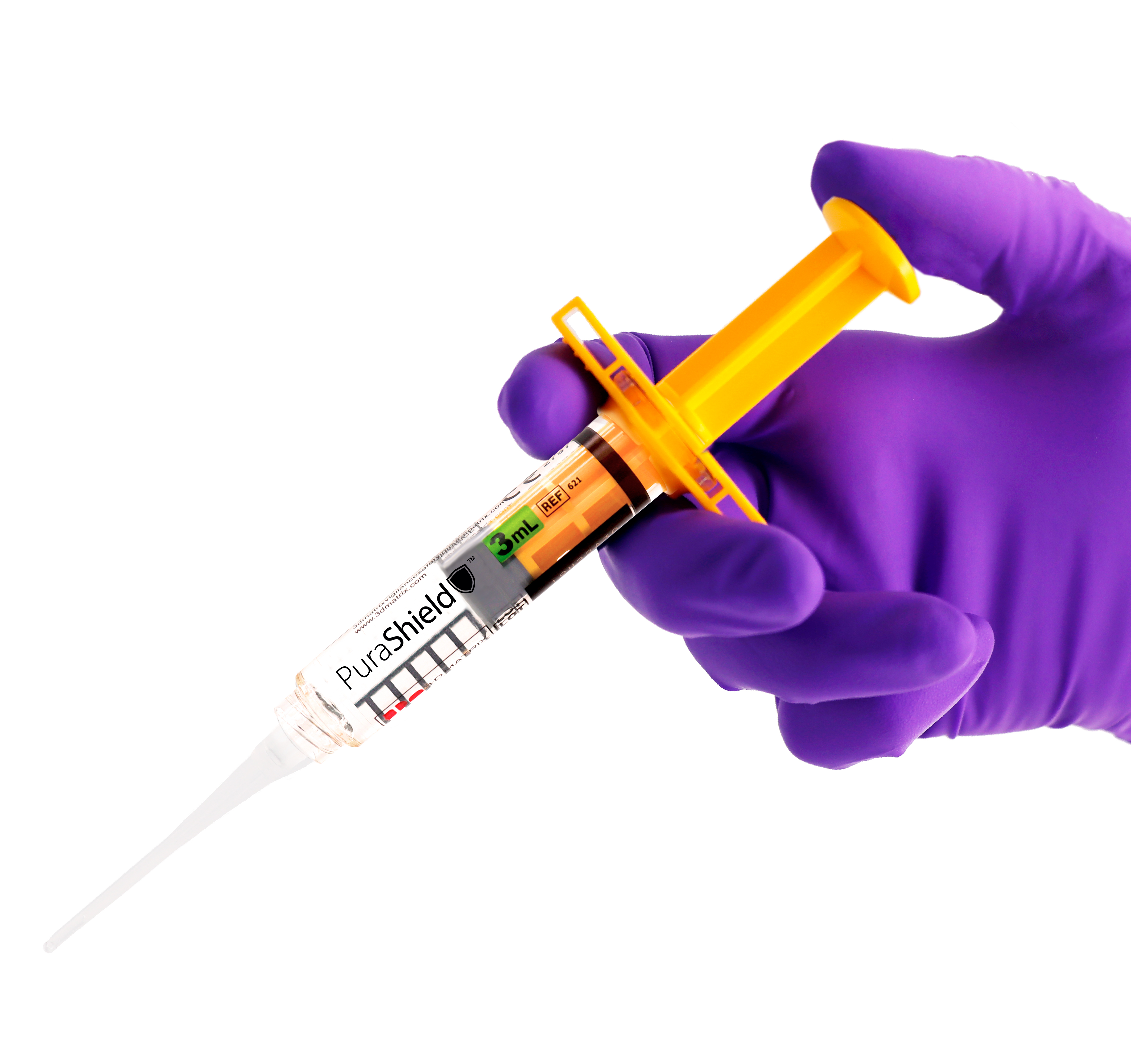
PuraShield
PuraShield is a synthetic haemostatic material for ENT surgery. A ready-to-use, slightly viscous hydrogel, composed of self-assembling peptides (SAPs) founded by the Massachusetts Institue of Technology (MIT), whilst undergoing tissue regeneration research. PuraShield is licenced in Spain as a medical device for use in Ears, Nose, Throat, Head and Neck surgeries.
PuraShield has many advantages which lend it to being a suitable bleeding management solution for FESS, adult tonsillectomies, thyroidectomies and amongst many other types of surgery. PuraShield's composition mimics the human extracellular matrix, and it does not cause swelling of the tissue. Its transparency and viscosity ensure precise control while maintaining visibility during the surgery, even in the event of working in small and narrow spaces.

